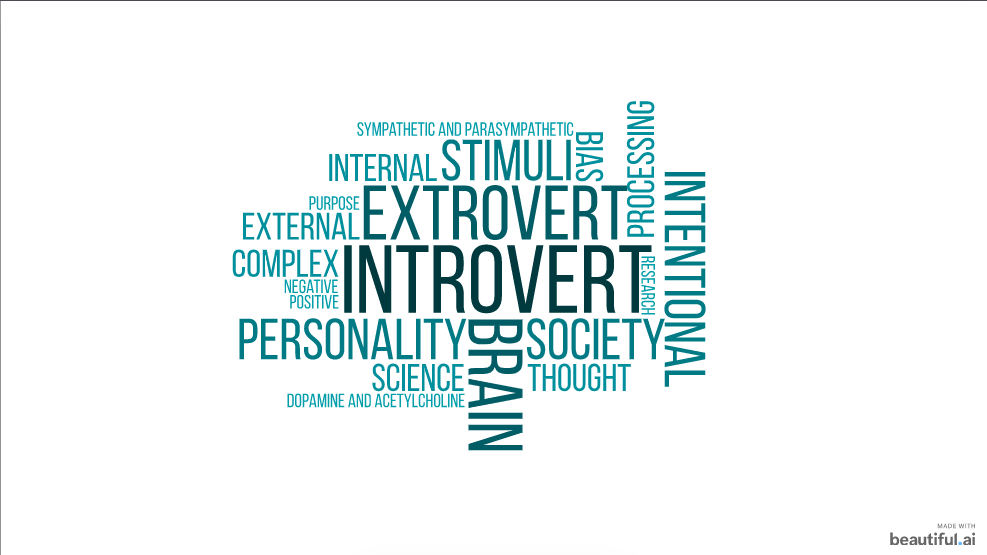On the scale of introversion/extroversion, everyone falls on a different point. Society has trained introverts to think that their natural, contemplative thought process should be abandoned in favor of mimicking extroverts. (Photo Courtesy of Ellie Thompson)
When someone says introvert, what picture fills your head? The person in the corner at a crazy party? The friend who stays home on Friday night to read alone? Someone scared to introduce themself to new people?
You probably didn’t think of a beloved boss who manages well, or a person laughing with their friend at a coffee shop, or an energetic, loyal friend. All the images you thought of were probably negative — our society is becoming tailored for extroverts, making introverts seem out of place, said Susan Cain, writer of Quiet: The Power of Introverts in a World That Can’t Stop Talking, in a TedTalk.
According to The Myers and Briggs Foundation, 50.7% of the population are introverts. Yet extroverts seem more common because society sees more value in working a room, hosting a party, and holding everyone’s attention. They see introverts as reserved and reclusive, while extroverts hold these outgoing traits that appear so valuable.
Introversion does not equal shyness. It is not the same as being antisocial. The idea of introverts and extroverts is deeply rooted in your brain, literally.
It’s important to note that not all introverts are the same. The introvert/extrovert scale is a spectrum, meaning that everyone will relate differently with the traits described. The unspoken belief that if you identify as an introvert, you must mold and shape yourself to fit all of the traits is false. Rather, knowing about introversion should bring relief that others relate to your struggles, not additional pressure to fit a stereotype.
The Science
The human brain is fascinating in how it is uniquely tailored. The introvert and the extrovert brain favor different neurotransmitters, nervous systems, and brain pathways, according to The Powerful Purpose of Introverts, by Holley Gerth.
“Neurotransmitters are chemical messengers in the body,” said Medical News Today. These shape our responses and behaviors and transmit signals from our nervous system to various parts of our body. There are two types of neurotransmitters: dopamine and acetylcholine.
“Think of dopamine like caffeine,” wrote Gerth. Dopamine is part of a rewards system that makes you feel good when you seek pleasure and external stimulation. Introverts need less dopamine to feel their best than extroverts do.
On the other hand, acetylcholine is triggered by internal stimulation, such as meaningful conversations or focusing on ideas. “It powers our abilities to think deeply, reflect, and focus intensely on just one thing for a long period of time,” said QuietRev. The introvert brain prefers this reward, while extroverts favor dopamine.
There are two pathways our brains could choose: sympathetic and parasympathetic. “The sympathetic nervous system gets us ready for action and is associated with the fight-or-flight response. The parasympathetic nervous system relaxes and restores us,” wrote Gerth.
As you might be able to guess, introverts lead towards the parasympathetic. While everyone uses both, introverts feel drained in highly stimulating environments which cause them to rely on their sympathetic nervous system. Because of this, introverts can do what extroverts can’t — work on a project alone for hours, stay fully engaged on one person, or “go on long drives without music just to think,” said Gerth.
The brain pathways introverts favor are also different. They use a longer, more complex, internally focused path that indicates a thought process. This pathway, as opposed to extroverts’ shorter, more straightforward path, allows them to think more deeply and critically. It’s often why they take longer to respond. If it’s something they care about, they will turn inward to give insight.
Introverts value internal stimuli over external, not just in responding to situations, but in the intricate way their brain processes.
The Social Bias
“[O]ur society’s bias against introverts is deep,” said Kathy Caprino of Forbes Magazine. Many normal requirements in school, such as classrooms tailored around participation, requiring each student to speak out loud, favors extroverts. In such situations, introverts can feel quickly overwhelmed by having to come up with “new ideas without having time to think them through,” wrote Caprino.
The same is reflected in large group settings. Extroverts are often the life of the party because they draw energy from external stimuli. This leaves introverts out, as they would rather retreat with an intimate friend. Everyone either knows or wants to know the extrovert, but the introvert can feel invisible.
According to Verywellmind, introverts thrive in intimate settings, where they can deepen relationships with close friends. “[I]ntroverts prefer to stick to deep, long-lasting relationships.”
In a society tailored for extroverts, especially in leadership — where the loudest voice is the one listened to the most — introverts feel overshadowed, as if their ideas are less valuable. But “there is zero correlation between being the best talker and having the best ideas,” said Cain. Extroverts seem like the best choice, but healthy introverts have their own talents:
- Good listeners – they consider the ideas of others before making decisions and are engaged where they are.
- Self-confident – because of their reliance on internal stimuli, they are seen as calm and collected, and are reassuring to others
- Deep thinkers – they dive into a subject to offer the best insight, rather than constantly jumping between ideas.
- Humility – they are aware of their talents and shortcomings, and they don’t overestimate their abilities.
Relationships
How can you relate to introverts, and how can introverts relate to others? As an introvert myself, there are a few key things I wish those around me remembered.
First, the time we need to recharge isn’t sitting in the dark alone. Many times, it looks like walking with a friend, something intimate with someone who makes them feel comfortable. Recharging just means we’re comfortable and feel secure.
Second, make us feel known. Sometimes it’s a text or a note, sometimes it’s an invitation to spend time with a friend — just like everyone, introverts want to know people care about them.
Finally, we don’t hate people. We actually love people deeply and intentionally, but too much stimulation is draining. Introverts can love parties and concerts and staying up late. They love being loud and crazy and connected. The problem occurs when they find no rest, however that may look. Because of this, if an introvert chooses to spend time with you, that means you’re pretty special.
Whether you are an introvert or you know one, remember that they are all into the things they love.
Introverts and extroverts have their own, unique talents to offer. Society needs both the eager, intense extrovert, and the thoughtful, intentional introvert in order to improve and progress.

Hi! My name is Ellie and I am the editor in chief for The Mycenaean. I play soccer at NCFC and go to The Summit Church!

Leave a Reply